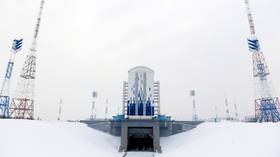Vostochny spaceport scandals continue: CEO of company operating new Far Eastern Russian cosmodrome arrested on corruption charges

A high-ranking official at the helm of the new state-of-the-art Vostochny spaceport, in Russia's Far East, has been arrested on charges of fraud in a high-profile scandal. The scheme reportedly cost the state over $6.5 million.
Roman Bobkov, the head of the state entity operating the cosmodrome, has been placed in pre-trial detention for two months by a local court, on Saturday, and faces several charges, including fraud, abuse of office, and incitement to abuse of office and forgery. He assumed the role of director at Vostochny in March 2019.
Bobkov is accused of using bribery to entice a senior Defense Ministry inspector, Dmitry Fomintsev, to file fake reports on the commissioning of several of the spaceport’s major water-supply facilities. The fraudulent documents were allegedly drawn up to conceal Bobkov’s own misconduct during their construction, which had left them unfinished.
Also on rt.com ‘They keep stealing in hundreds of millions’: Putin outraged by ongoing fraud at Vostochny Cosmodrome constructionThe official’s machinations have cost the Russian authorities some 500 million rubles ($6.56 million), Moscow daily Kommersant reported. They also posed a potential safety hazard, as the water-supply facilities in question were meant to provide water for both the rocket-fuel production facility, and fuel storage and fire protection systems in the neighboring town of Tsiolkovsky, in the Amur Region, a remote Far Eastern territory, bordering China.
Fomintsev was arrested earlier this week. According to Russian media, he had agreed to forge the reports in exchange for a lucrative job offer that had been extended by Bobkov. The director offered both the inspector and his wife positions within his domain, with a salary of 500,000 rubles ($6,560) a month each.
The scandal has also rocked the Russian space agency Roscosmos. Its head, Dmitry Rogozin, has fired another senior manager operating the Vostochny cosmodrome and given a reprimand to Bobkov’s superior, Andrey Okhlopkov, who leads a bigger structure within the space agency, supervising the management of both the Vostochny and Baikonur cosmodromes.
Designed as a cutting-edge spaceport and expected to become the backbone of Russia’s future space exploration, Vostochny has been plagued by scandals and fraud cases throughout its construction period. These problems reached such a scale that President Vladimir Putin grilled the government over the issue in November 2019, in the wake of several other high-profile embezzlement cases.
Also on rt.com Two-hour trip to space: Russian spacecraft will travel to ISS THREE TIMES fasterThe cosmodrome could still play a major role in Russia’s space program. Last year, Roscosmos said it had developed a way for a Soyuz spacecraft to travel to the International Space Station (ISS) three times faster than it can now. Such flights could take just two hours to reach the ISS, saving fuel and resources in the process, thanks to the reduced number of orbits a spacecraft would be required to make around Earth before reaching the station.
The technique could also be used in Russia’s Moon exploration program. The Vostochny cosmodrome would be much more convenient for “quick launches” than the currently used Baikonur complex in Kazakhstan, Russian scientists believe.
Think your friends would be interested? Share this story!












